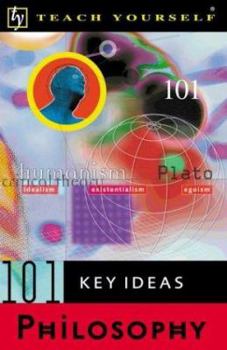Teach Yourself 101 Key Ideas: Philosophy
Teach Yourself 101 Key Ideas: Philosophy is an accessible guide to the key people and ideas that have shaped cultures through the centuries. Author Paul Oliver identifies the most influential... This description may be from another edition of this product.
Format:Paperback
Language:English
ISBN:0658012045
ISBN13:9780658012044
Release Date:March 2001
Publisher:McGraw-Hill Companies
Length:112 Pages
Weight:0.35 lbs.
Dimensions:0.4" x 5.0" x 7.7"
Customer Reviews
2 ratings
Nice, handy, and lightweight philosophy dictonary.
Published by Thriftbooks.com User , 21 years ago
Nice, handy, and lightweight philosophy dictonary.
Western philosophy in 101 pages
Published by Thriftbooks.com User , 23 years ago
This book describes itself as something between a dictionary and a philosophy textbook. In a textbook, the definitions would go on and on for pages. In a dictionary, there are often only one or two sentences. In this format, every term, person etc.. gets one page, which comes out to roughly 300 - 400 words each. In the definitions, there is often a definition a paragraph in length, then arguments for the concept and then criticisms that have been offered against the concept. Often, there is an illustration of the theory, which may be of assistance to people who are new to the subject. This is a useful ready reference book for someone wondering what some of the major ideas have been in the past 2500 years of Western philosophy.Some of the different concepts and persons covered are:EmpiricismEthicsKarl JaspersContinental PhilosophyArgument ad hominemAbsolutismMaterialismPhilosophy of EducationRationalismRene DéscartesJohn LockePantheismMeaningExistentialismNaturalismFree WillDeductionEgoismMetaphysicsObjectivismMy criticism of the book is that if occasionally explains a term via an analogy or scenario but then fails to provide a clear definition of the term itself. However, only a handful of the entries are like this.In ethics, I think I would affirm Absolutism and Objectivism which are defined as: Absolutism: "This is the general philosophical view that there are fundamental truths about the world which are independent of the opinions of individual people or of different societies... Ethical absolutism is the view that there are moral principles which are true in all cultures and societies, and at all times in history, irrespective of whether human beings do in fact adhere to them." (page 2)Objectivism: "This is the contention in ethics that there are certain moral principles which are true and which are quite independent of the beliefs of individual human beings." (page 69)Some of the other frankly illogical and dangerous ideas are emotive theory ("... the view that moral judgments are fundamentally an articulation of feelings..." page 32) or relativism ("Relativism takes the view there are no fixed or absolute standards in relation to knowledge about the world, moral behaviour, social organization, or any other aspect of human life." page 84). Emotive theory is apparently a representative of the non-cognitivist school of ethics. The series, as far as I know, is British. Both this series (101 key ideas) and the other "Teach Yourself," books are British. Their style is somewhat different from American or Canadian writing but as this is a ready-reference work, that is not really an issue.The end of the book is a one page long, "Further Reading," section. Two excellent Christian books that cover some of these ideas and provide a Christian response are:The Baker Encyclopedia of Christian Apologetics by Norman GeislerRelativism: Feet Firmly Planted in Mid-Air by Francis J. Beckwith and Gregory Koukl






